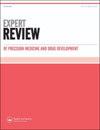肿瘤对靶向治疗无反应的肺癌患者联合用药的鉴定:临床基础和未来方向
IF 1.2
Q4 PHARMACOLOGY & PHARMACY
Expert Review of Precision Medicine and Drug Development
Pub Date : 2022-01-02
DOI:10.1080/23808993.2022.2050369
引用次数: 1
摘要
靶向治疗在肿瘤基因成瘾晚期NSCLC患者的生存和安全性方面取得了前所未有的成果。然而,由于几种不同的耐药机制,这些患者最终对这些治疗无反应。此外,目前缺乏后续治疗,迫使这些患者接受较难耐受和较无效的化疗方案。因此,本文旨在回顾针对癌基因成瘾晚期NSCLC患者的靶向治疗的最新进展,重点关注耐药机制和克服耐药的药物组合。专家意见我们坚信,基于耐药突变的个性化序贯治疗方法将成为癌基因成瘾晚期NSCLC患者的标准治疗方法。此外,我们相信TKI联合治疗方案将发挥关键作用。同样,含ici的方案将在没有耐药突变的患者和正在接受TKI治疗的患者中发挥作用。本文章由计算机程序翻译,如有差异,请以英文原文为准。
Identification of drug combinations for lung cancer patients whose tumors are unresponsive to targeted therapy: clinical bases and future directions
ABSTRACT Introduction Targeted therapies have granted unprecedented results in terms of survival and safety to oncogene-addicted advanced NSCLC patients. However, these patients eventually become unresponsive to such treatments due to several different resistance mechanisms. Moreover, the current lack of subsequent-line treatments forces these patients to receive less tolerable and less effective chemotherapy regimens. Areas covered Thus, this paper aims to review the current state of the art with respect to targeted therapies for the treatment of oncogene-addicted advanced NSCLC patients, focusing on resistance mechanisms and on drug combinations to overcome them. Expert opinion We strongly believe that a personalized sequential treatment approach based on resistance mutations will become the standard of care for oncogene-addicted advance NSCLC patients. Furthermore, we believe that TKI combination regimens will play a key role. In the same vein, ICI-containing regimens will play a part both in patients without druggable resistance mutations and in patients progressing on TKI therapies.
求助全文
通过发布文献求助,成功后即可免费获取论文全文。
去求助
来源期刊

Expert Review of Precision Medicine and Drug Development
PHARMACOLOGY & PHARMACY-
CiteScore
2.30
自引率
0.00%
发文量
9
期刊介绍:
Expert Review of Precision Medicine and Drug Development publishes primarily review articles covering the development and clinical application of medicine to be used in a personalized therapy setting; in addition, the journal also publishes original research and commentary-style articles. In an era where medicine is recognizing that a one-size-fits-all approach is not always appropriate, it has become necessary to identify patients responsive to treatments and treat patient populations using a tailored approach. Areas covered include: Development and application of drugs targeted to specific genotypes and populations, as well as advanced diagnostic technologies and significant biomarkers that aid in this. Clinical trials and case studies within personalized therapy and drug development. Screening, prediction and prevention of disease, prediction of adverse events, treatment monitoring, effects of metabolomics and microbiomics on treatment. Secondary population research, genome-wide association studies, disease–gene association studies, personal genome technologies. Ethical and cost–benefit issues, the impact to healthcare and business infrastructure, and regulatory issues.
 求助内容:
求助内容: 应助结果提醒方式:
应助结果提醒方式:


